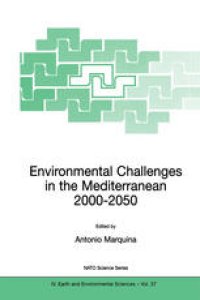
Ebook: Environmental Challenges in the Mediterranean 2000–2050: Proceedings of the NATO Advanced Research Workshop on Environmental Challenges in the Mediterranean 2000–2050 Madrid, Spain 2–5 October 2002
- Tags: Social Sciences general, Environment general, Sociology general, Atmospheric Sciences, Soil Science & Conservation
- Series: NATO Science Series 37
- Year: 2004
- Publisher: Springer Netherlands
- Edition: 1
- Language: English
- pdf
This book collects most of the contributions prepared for the NATO Advanced Research Workshop (ARW) on Environmental Challenges in the Mediterranean 2000-2050. The ARW took place in Madrid from 2 to 5ofOctober 2002. Scholars and researchers from North and South ofthe Mediterranean and other countries from NATO gathered in Madrid for discussing several important factors that could affect Mediterranean security in the next 50 years. In this regard the first chapter presents the different debates regarding environmental security that took place in the last decade. This chapter is an introductory chapter and takes into account the possible audience in the Southern Mediterranean and the wishes ofsome contributors. For this reason the chapter deals in extenso with the question ofhuman security and the different approaches. The ARW dealt with issues that may affect the supply of fundamental goods for human living. To this end the complex question ofclimate change, its impact in the Mediterranean, the predicted increase in temperatures and predictions about rainfall are analysed. As part of this approach a chapter about solar variability and climate change is also added.
The book stresses the six key structural factors that will affect future environmental policies in the Mediterranean region during the next fifty years: population growth, climate change, soil erosion and desertification, water scarcity, food production, and urbanization and pollution. The contributors point out the potential of all these problems as sources of violent conflict, their policy implications, and the possibilities for the development of preventive policies, based on cooperative strategies.
The interdisciplinary approach of the book makes it relevant and useful to a broad range of professionals, specialists and researchers.